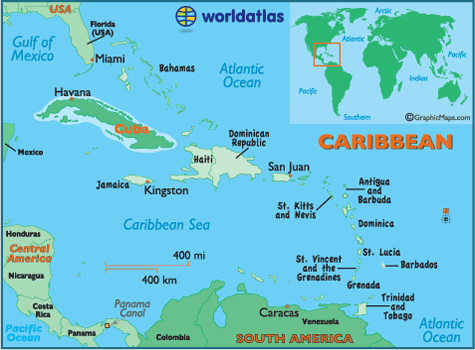



According to the Jan. 10 New York Times, an additional 3,000 Cubans are in Panama. The anti-Cuba weapon is the 1966 Cuban Adjustment Act (CAA), which affords unique privileges — including a quick path to citizenship and permission to work legally — to any Cuban who reaches U.S. territory by any means. Although the Obama administration has steadfastly refused to consider any changes to the CAA, the opening of U.S.-Cuba diplomatic relations spiked the number of Cubans seeking to take advantage of those special benefits before the normalization process ends them.
Contrast that to the Obama administration’s New Year’s raids and deportations of Central American refugee families who sought safe haven from warlike conditions in their homelands, conditions created by U.S. imperialism. Where do the drug cartels, paramilitaries and repressive coup regimes, like in Honduras, get the guns? Who profits off the international weapons trade? At the same time, the so-called U.S. Agency for International Development and the National Endowment for Democracy work for “soft coup” destabilization against progressive governments like those in El Salvador and Venezuela. This double standard made headlines in the 1990s, too, when Haitians attempting to reach Florida by boat were sent back to Haiti while Cubans were welcomed.
Noted professor and author Salim Lamrani wrote in a Jan. 6 public email about the CAA: “This is a great tool for inciting illegal emigration. For nearly 50 years, the richest country in the world has opened its doors to the population of a small, poor, Third World country with limited resources and victim, moreover, of extremely severe economic sanctions.”
The CAA is the carrot end of the stick that is the U.S. economic, financial and commercial blockade. The architecture for the blockade was laid out in an internal U.S. State Department memo dated April 6, 1960. Admitting the Cuban people’s support for the Revolution, the document concluded: “The only foreseeable means of alienating internal support is through disenchantment and disaffection based on economic dissatisfaction and hardship … a line of action which, while as adroit and inconspicuous as possible, makes the greatest inroads in denying money and supplies to Cuba, to decrease monetary and real wages, to bring about hunger, desperation and overthrow of government.” (tinyurl.com/h6tm8e5)
In addition to the CAA, since 2006, the Cuban Medical Professional Parole Program solicits Cuban educated “doctors, nurses, paramedics, physical therapists, lab technicians and sports trainers” (state.gov) to abandon international service and migrate to the U.S., taking along with them their high quality professional training that was provided to them without cost by the Cuban Revolution.
Cuba’s revolution spreads
free health care
More than 50,000 Cuban medical internationalists are serving in at least 66 countries. Often, the Cuban doctors are the very first medical professionals rural and poor people have ever seen. Cuba sent medical brigades to Algeria in 1961 and even earlier to Chile following a devastating earthquake there. From the hillsides of the Himalayas to tracking down the sources of cholera in Haiti to fighting ebola hemorrhagic fever in Liberia, Guinea and Sierra Leone — there are Cuban doctors. And we can never forget that more than 1,500 fully equipped Henry Reeve Brigade, disaster trained, medical professionals waited to help the people of the U.S. Gulf Coast to survive hurricanes Katrina and Rita. But George W Bush said they weren’t needed! This was the very same Bush who almost on the anniversary of the hurricanes instituted the CMPPP to lure the doctors whose previous offer of help for New Orleans he refused.
On Jan. 8, Reuters reported the CMPPP is under review with an announcement on whether to end it is expected before the end of the month. “With such a thaw under way, the parole program no longer seemed to fit what the White House has called a ‘new chapter’ in U.S.-Cuban relations.”
After the 1959 revolutionary victory, half of Cuba’s doctors opted for life in Miami, leaving only 3,000 medical professionals in a country of millions with vast inequalities. Not only professionals, but also many wealthy and light-skinned Cubans fled to Miami. But the police, military officers and torturers of the Batista dictatorship came, too. The 1966 CAA was crafted for their benefit. Now, the anti-Cuba minority in Congress opposes the CAA, citing the current emigres as unworthy — pointing out that many quickly return to Cuba and travel back and forth freely, which, by the way, is a boon to the Miami economy, where the majority of the many, many daily charter flights to Cuba originate.
In place of the CAA, the U.S. government needs to adjust its relationship with the world and its people. That means ending the blockade of Cuba, respecting its sovereign right to self-determination and its socialist economic plan, returning occupied Guantánamo, and ending the multitude of hostile policies and actions, including the CAA and CMPPP, which use immigration as a weapon, and also defunding the USAID, the NED, and propaganda TV and radio broadcasts to Cuba.
It also means ending the raids and deportations, recognizing the refugee status of the Central American migrants and adjusting the status of the millions of undocumented without political bluster. Doesn’t the CAA show it can be done, at least when it serves their political purposes?
In the 1950s, when Japan and much of Europe was in ruins, the U.S. accounted…
This “Call from the General Federation of Trade Unions in Gaza to Labor Unions in…
Desde que la administración de Donald Trump/Elon Musk tomó las riendas del poder a finales…
Philadelphia Palestine activists marched from Philadelphia City Hall to Day & Zimmermann on April 18…
Marching up Blue Hill Avenue through the Black and immigrant Dorchester neighborhood, Trans Day of…
This statement was recently issued by over 30 groups. On Friday, March 28, Dr. Helyeh…